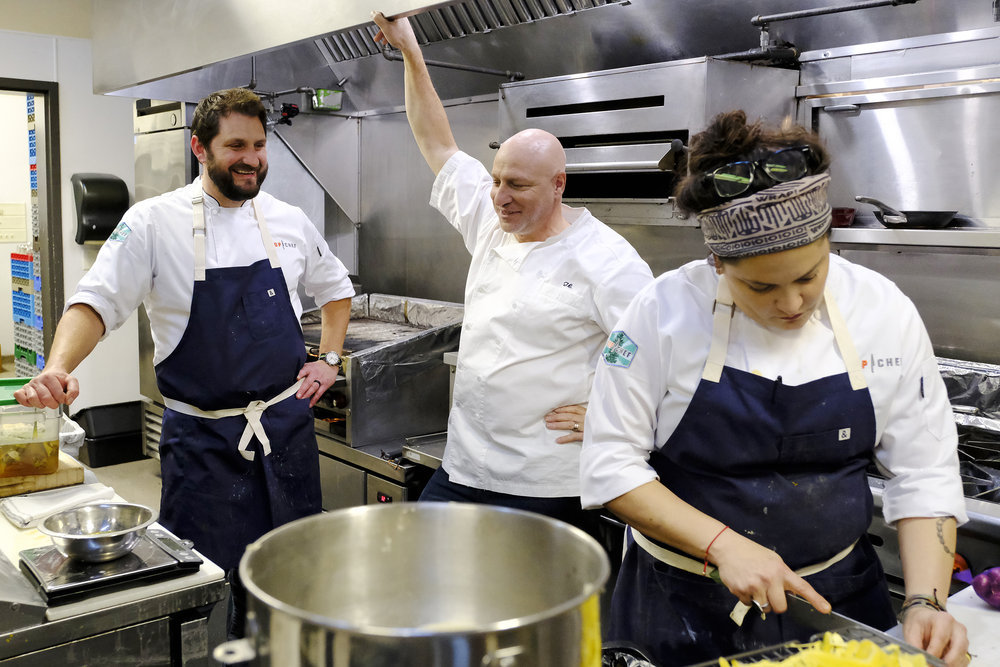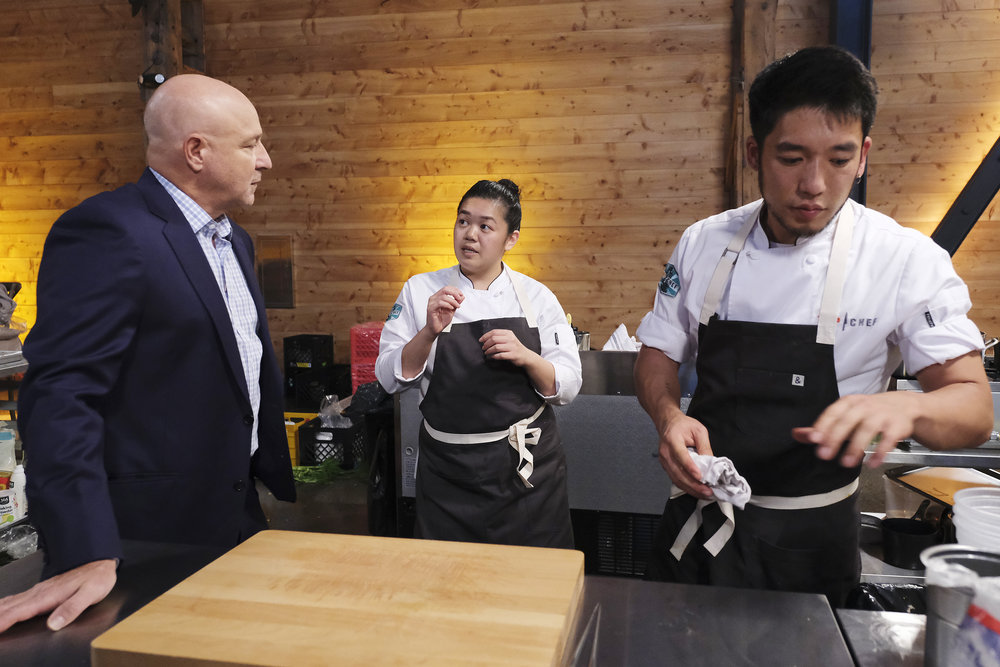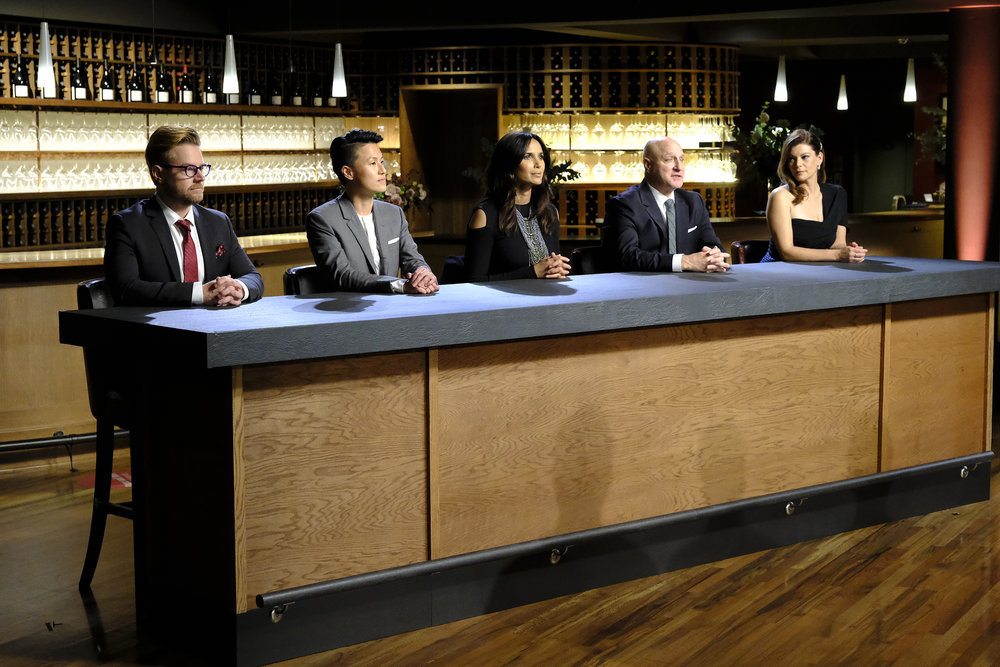Top Chef is still basically the only cooking competition show that I can reliably watch without feeling dumber for having done so. Even in the midst of a “cooking competition,” even after 18 seasons, there’s an authenticity to Top Chef that the imitators can’t match.
A lot of that, I think, comes down to the judges and the contestants. They seem to understand on a basic level that a cooking competition is a trifling concern in the grand scheme of things, but they love cooking so much that they can’t help but care intensely nonetheless. Other shows feel like they’re trying to sell you on the concept of food. Top Chef doesn’t have to pander in that way or try to whip up a studio audience into a phony frenzy. The passion of the contestants and judges speaks for itself.
Tom Colicchio is a case in point. I love to rag on his jaunty hats and hyper-specific nitpicking in my weekly power rankings, but every time I talk to him I come away impressed at just how damn good he is at his job. That steely competence he projects isn’t just an illusion created by his sled dog eyes. His occasionally esoteric critiques wouldn’t be compelling if he was full of shit, but talk to him for more than a few seconds and you get the impression of someone who’s practically allergic to putting on airs. Nor does he do it, Simon Cowell-like, because he knows that’s his shtick and he’s performing for an audience. Colicchio will bring up, unprompted, a contestant from past seasons, and rattle off all the reasons that contestant was eliminated in an episode filmed four years ago.
All of which is to say: Colicchio is voluble and food-crazy in a way I find endlessly entertaining. A five-time James Beard award winner, owner of a restaurant empire, and a Top Chef judge since 2006 (he’s now an executive producer), I spoke to Colicchio this week in advance of the season 18 finale.
—
How has this season been as a judge?
Well, we shot back in September and the challenges, obviously, were COVID and keeping our production safe. Which we did. We have about 150 people on our crew and no one got sick. We also shot during the fires in the Northwest, which was really challenging at times, because there were five days where there was really thick smoke in the air, so that was somewhat disruptive. But it was a good season. A lot of the chefs were out of work because of COVID, and, you saw this season, the chefs really came together. They’re very supportive of each other. I think COVID had a lot to do with that.
It was also great to get out of the house and do something that sort of took my mind off my restaurants being closed and all that stuff.
To me, this season seems like it’s been one of the more entertaining ones that I can remember. Do you think any of the COVID challenges of shooting forced you guys to do things that ended up working?
Sure. Obviously, the one big change was bringing back all of the ex-contestants as judges, and having them with us pretty much every meal. That was kind of neat. Restaurant Wars is clearly very different, and very successful, I thought. One issue that’s come up the last couple of episodes was Dawn leaving food off of plates, and why she was allowed to go through. This typically happens, only we don’t see it, and the audience really doesn’t see it, because a lot of times they’re not left off the judges’ plates. But because you’re actually getting comments from every diner, I think it showed up a little more.
In the last episode, I think they had to shell Dungeness crabs two ways, for 12 people. That struck me as one of the harder things that you’ve ever asked them to do. Where do you rate that, in terms of difficulty?
The crab, obviously you have to pick through it, but often what happens on the show is, number one, the clock is always running. And so you have to figure out what you can do considering the clock and considering that you’re plating everything yourself. It’s very different than if you were in a restaurant, where you have a team of cooks and sous chefs and there really is no time limit — with the exception of, people want their food on time. But there are systems set up to expedite food. And so, part of the process of putting together dishes, it all comes down to execution. If you make everything you’re doing too complicated, you can’t execute it.
Right.
And so it’s really a matter of what the chefs choose to do. That’s what makes it difficult, not necessarily the challenge. Part the reason I think why the show works so well is because there are chefs who think they can do a lot more than they can. Not in terms of talent, but in terms of time and what they think they can do, and all of a sudden they run out. I think all these challenges are difficult. Quite frankly, I thought the challenge where they had to make food for the frontline workers was hard because, it’s food that had to be delivered, there was a very low price point on it. And they did okay.
The crab challenge, you say it’s hard, but that was probably the best food we had all season.
That frontline worker challenge, I think it was Chris who did a chicken breast. I was surprised you guys didn’t penalize him more harshly for doing, what in my mind is the most stereotypical…
No, you don’t get penalized for doing that. You get penalized for doing it wrong. We judge on what they did, and how they executed it, not, they made a decision to use chicken breasts. That’s okay. It’s fine and a lot of people like chicken breasts for lunch. Did you overcook the chicken breast? Was it seasoned properly, was it cooked properly? That’s what’s more important.

Obviously, judging the show, you guys are forced to sort of nitpick a lot, just to separate the chefs. Out in the real world, what do you think your most frequent criticism, or your most frequent food rant is?
I don’t criticize when I eat out myself. I don’t rant, I don’t criticize. I go out and eat dinner, and that’s it.
Even internally?
I’m just the opposite because I don’t want to be “that guy.” So I just eat my food, and that’s it. I’m just happy when someone else is cooking for me. For me… and this is sometimes not anyone’s fault except for the press, and I’m not ragging on the press here, but I think often new restaurants get hyped up. And you buy into that hype. Even knowing that I shouldn’t buy into the hype, I do anyway. You go there with a set of expectations that are so high that there’s no way that a restaurant is going to meet that. So, for me, I try to go in and not read stuff about it.
I don’t go out to nitpick food. A long time ago, when I was in my early twenties, with my first serious girlfriend, I would go out and I would start nitpicking food. And she just told me, you know “This isn’t fun. I just want to enjoy my food now, I don’t need to hear it.” Ever since then, I don’t do that. I just eat, I don’t make opinions. I mean, I have my opinion. I don’t make them known. If it’s good, I go back.
Because of who you are, do you ever sense people expecting feedback from you, or being hyper-aware of what your experience of their food is?
I think they’re hyper-aware, but I think that happened before the show. Chefs are always aware when other chefs are in a restaurant, and we kind of go out of our way to make sure that those tables are great. When we’re cooking for our peers, we pay attention to it.
Finale excluded, what do you think was the single best dish that you had this season?
My favorite was the hotpot rice dish that Shota made, with the help of everybody, for the Restaurant Wars episode. That was so good. In fact, I remember my 12-year-old asking me, “Which dish was your favorite, Dad?” And I was like, “I can’t tell you, but if we watch it, I’ll let you know,” because I don’t tell my family anything when I come home. This was the first year that my kids watched the show. And when they were watching Restaurant Wars, I told them, “That’s my favorite dish.”
That was stunning.

Were you shocked that that turned out so well? Because they had so many people involved, and so many different things going into that?
No, listen, that could be a disaster. But we’re not privy to all the stuff that goes on behind the scenes. The only time I spend with the chefs is on camera. And so, after watching the episode, I wasn’t surprised at all because they all worked together really well. There were fewer egos on that team, I think. And the other team, on paper, probably looked like they had a better team. But you saw what they did. [Shota’s team] said, “Listen, here’s the concept.” And the concept is a mashup of Latino food and Japanese food, and I think every dish had that in mind. As opposed to the other team, where they just said, “Hey, we’re all doing seafood dishes. I have my dish.” You went through that whole menu, there was not one piece of cooked fish. It’s crazy when you think about it. So these were just a bunch of chefs saying, “Hey, I’m going to do a dish, and I think it’s going to be good, and I’ll be okay.” And this other team, they really took it to heart and said, “We want to create something new, something that’s exciting.” And they all contributed to it, and no one tried to steal anybody’s thunder. And it was just extraordinary, to tell you the truth.
I think you guys did one challenge where you tasted the dishes blind, not knowing which chef was which.
First episode, yeah.
Is there a reason you don’t do that on every challenge? Just to sort of take whatever your bias might be out of it, or whatever?
Well, there’s no bias in it, that’s just it. I eat food, and for me it’s, “Was it cooked properly, was it seasoned properly?” Those are the first two things, and quite frankly, you can stop there and that’s how people get eliminated. From there you can go into, “What was the challenge? Did they adhere to the actual challenge?” And then if it’s close, then you could dig into it. But I think we did it just to do it, but the other reason why tasting blind is hard to do is because then we can’t connect a person to the dish. And therefore, the viewer can’t connect the person to the dish. So when we talk about it, often we say, “Gabe’s tacos are like, Shota’s sushi dish was…” Without that, what we’re saying is, “The taco dish, or the sushi…” And then it’s just hard to follow.
Right.
But none of us really care who wins. And again, the stuff that goes on behind the scenes where people tend to like someone for whatever reason? We don’t see that. So we don’t care. How can I say it? I don’t have a horse in this race.
And in terms of, not understanding, culturally, someone’s food? I can go back to Eric getting thrown off, it had nothing to do with culturally what he was doing. It had to do with he used a thickener in his tartare that was disgusting. You didn’t hear this on the show, but it had nothing to do with African food. It was like lecithin or something because he wanted it to have this mouthfeel, that was nasty. And we didn’t play that, because it would have been so obvious from the start that he was going home. So often, in the editing, we try to make it a horse race and people are left to be confused.
So no, I’ll say it to the end, there’s no bias in judging.
Right. I mean–
And then, if you go to the makeup of casting. Every season, we cast equal amounts of men and women. Our industry is not made up equally, of men and women. But we cast that way. If you look at how we cast for diversity, our industry is not as diverse as the makeup of the diversity of our contestants. So there’s that. Anyway, but people say, “You should just do the whole season blindfolded, because of bias.” Nah, whatever. You’d end up with no difference at all, I think.
Is another reason that’s hard — at least for me, when I’m drinking a cocktail or eating anything, I feel like the story is part of what I’m tasting. Do you think that the chef’s story through the food is part of the experience?
It’s part of the experience, it’s not part of the judging. Meaning, you have to separate the two. “It’s a great story you just told, but it’s not going to come into the equation when it comes to judging the dish.”
Now, unless it’s part of the challenge, then it could make sense. But no, again, it’s about, was it cooked properly, was it seasoned properly? I like to know what the intention is, I like to know what the chef was trying to do, because then it’s a question of whether or not they were able to accomplish that comes into play. So that’s important, intention. Composition, in terms of balance. You look at technique. You look at if someone’s protein wasn’t seared properly, if they wanted it seared properly. If something was fried, was it fried properly? If something is roasted, was it roasted properly? Is it properly rested?
So there’s a lot of technical things that go into it. You don’t hear us talk so much about it because, again, the editors would think that’s boring.
How much of a role do you take during the editing process? Do you have a say–
Zero. None, no.
But you think it’s mostly, pretty fair representation of what you’ve critiqued when you watch it?
Yeah, sure. I think so, but a lot is left out. For the most part, we’re almost always in agreement without discussing it. But we can’t just go there and go, “Yeah, this is the worst dish,” and they go home. That’d be boring. And so, nothing’s manipulated, but we have to discuss it. And you’re going to hear parts of that discussion, not the whole thing because that whole discussion would take two hours.
What do you think was the least successful dish that you had, this season?
I have no idea.
Is that just the nature of the good ones being more memorable than the bad ones?
Yeah. I just don’t remember. Some of the early chefs that went home were clunkers, but just because someone goes home doesn’t mean they’re a bad chef. Sasha, she did really great in Last Chance Kitchen, she was the second chef to go home. She messed up, it happens. It happens to all of us. Especially with the way this works, where you’ve got to think fast and commit.
So a few years back, I don’t know, three or four seasons ago, you had Wolfgang Puck as a guest judge. He stands out in my mind as one of the funnier guest judges. Do you have favorites that you’re looking to bring back?
I would love to bring back the same crew that we had this season. I thought it was really great, having them all there, plus having them passing [COVID] tests, they really can relate to what the chefs are going through. So, yeah. I would like to do that. But I don’t know if I have favorites.
Aside from Charlize Theron. Yeah, and Natalie Portman.
You brought up having to shut down some of your restaurants, for COVID this past year. How are your restaurants doing now? Are they coming back? What capacity are you at, since indoor dining has been allowed again?
Let’s just say, we’re coming back. We’re still not near a hundred percent of the business that we were doing pre-COVID. Capacity, we aren’t at a hundred percent capacity, but… restaurants are busy. People are still leery. Some people are still reluctant to go out into spaces with a lot of people. There are plenty of people that are not vaccinated. There are variants that are going around, are more contagious, so people are still concerned. And staffing has been an issue. So, no. We’re not at a hundred percent, at all. Our restaurant in LA is only open for dinner right now, five days a week. We’re not open for lunch. When we open for lunch, I think next week, we’re only opening two days. It’s difficult staffing the restaurants, and demand is not a hundred percent there yet.

The season finale of ‘Top Chef’ airs July 1st. Vince Mancini is on Twitter. You can access his archive of reviews here.







